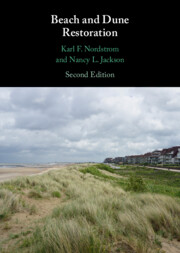Book contents
- Beach and Dune Restoration
- Reviews
- Beach and Dune Restoration
- Copyright page
- Contents
- Contributors
- Preface
- Acknowledgments
- 1 The Need for Restoration
- 2 Beach Nourishment and Impacts
- 3 Dune Building Practices and Impacts
- 4 Restoring Processes, Structure, and Functions
- 5 Altering or Removing Shore Protection Structures
- 6 Options in Spatially Restricted Environments
- 7 Stakeholder Interests, Conflicts, and Cooperation
- 8 A Locally Based Program for Beach and Dune Restoration
- 9 Research Needs
- References
- Index
3 - Dune Building Practices and Impacts
Published online by Cambridge University Press: 09 December 2021
- Beach and Dune Restoration
- Reviews
- Beach and Dune Restoration
- Copyright page
- Contents
- Contributors
- Preface
- Acknowledgments
- 1 The Need for Restoration
- 2 Beach Nourishment and Impacts
- 3 Dune Building Practices and Impacts
- 4 Restoring Processes, Structure, and Functions
- 5 Altering or Removing Shore Protection Structures
- 6 Options in Spatially Restricted Environments
- 7 Stakeholder Interests, Conflicts, and Cooperation
- 8 A Locally Based Program for Beach and Dune Restoration
- 9 Research Needs
- References
- Index
Summary
Chapter 3 discusses the ways foredunes can be built by human actions in locations where they have been eliminated. Alternative strategies for foredune development are reviewed including (1) using beach nourishment to provide a beach with sediment sizes that can be reworked by waves and winds; (2) constructing dunes by using earth-moving equipment to place fill sediment derived from external source areas, such as offshore borrow areas, navigation channels, or inland deposits; (3) using in-situ beach sand using earth-moving equipment (termed grading or scraping); (4) deploying sand-trapping fences; (5) planting vegetation; and (6) using a combination or multiple of these strategies. Time and space are critical to the evolution of landforms and vegetation gradients on developed coasts, and choice of techniques for dune building are evaluated under these constraints. The case is made that once newly built foredunes achieve their protective function, they should be allowed to evolve as naturally functioning environments to the extent allowable.
Keywords
- Type
- Chapter
- Information
- Beach and Dune Restoration , pp. 65 - 87Publisher: Cambridge University PressPrint publication year: 2021

